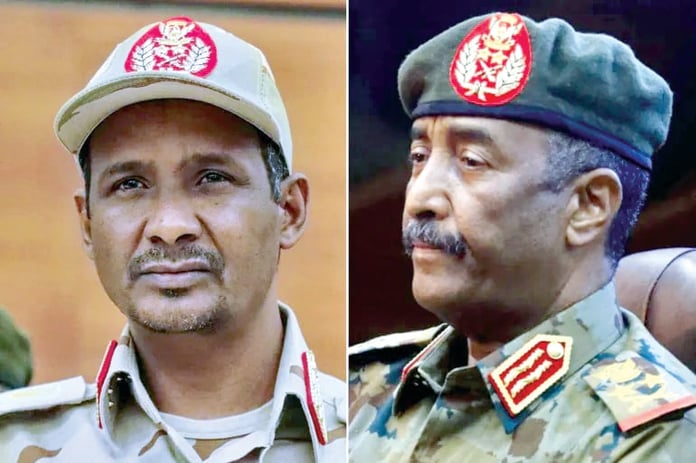The former US ambassador to Khartoum, Timothy Carney, saw that the conflict between the head of the Transitional Sovereignty Council in Sudan, Abdel Fattah Al-Burhan, and his deputy, the commander of the Rapid Support Forces, Muhammad Hamdan Dagalo (Hamedti), will have 3 possibilities, considering that neither side wants to negotiate.
He said to the program "What is behind the news" On Al-Jazeera, what Al-Burhan and Hemedti did, "Just a tactic"stressing that neither of them is ready to enter into serious negotiations, and what they seek is to improve their international image.
He explained that the modern state cannot have two independent armies, pointing out that the fundamental dispute between Al-Burhan and Hemedti is great, and relates to the period during which the Rapid Support Forces should be integrated into the army.
He pointed to the fears of the two commanders that the stage of impunity for any previous crimes may end soon and they will be tried, which is one of the motives for the explosion of the situation and the entry into these armed confrontations.
And he indicated that the situation leads to 3 future possibilities, the first of which is the victory of one of the parties, and dealing with it as a fait accompli, or the presence of a large and influential international role through support for the mediation of the African Union, or the adoption of a resolution by the UN Security Council that allows the imposition of peacekeeping forces, adding that the last possibility is a difficult step. support in this situation.
Commenting on Al-Burhan and Hamidati’s statements to Al-Jazeera about the truce and negotiations, the researcher at the Khartoum Center for Dialogue, Al-Rashid Al-Mu’tasim, said that it is not possible for the army to accept negotiations with what he called the Rapid Support rebels, as there is no room for accepting parallel forces that the Sudanese people do not accept, according to him. The continuation of the rapid support will cause a political crisis and expose the Sudanese state to division.
This comes against the background of statements made by Al-Burhan to Al-Jazeera, in which he expressed the Sudanese army’s readiness to negotiate if the Rapid Support Forces withdrew outside Khartoum, while the commander of the Rapid Support Forces, Hemedti, expressed, during an interview with Al-Jazeera, his support for a humanitarian truce and a temporary ceasefire, while stressing the need Getting rid of the proof to launch the democratic transition.
Al-Mu’tasim continues – in his speech to the program "What is behind the news"- "The tactic is included in political and military issues, but the current battle was postponed by the army, because in any case it would not accept any forces outside the framework of the authority of the armed forces of the state, because that means the existence of two states, especially in light of international relations to lead the rebel forces.".
And he believes that Al-Burhan’s statements may come within the framework of a message of reassurance that the army sends abroad by talking about preparing for negotiations, but on the ground, there is no open war, but rather limited skirmishes inside Khartoum, and all the states of Sudan are safe.
Just a tactic
necessity negotiations
The Sudanese writer and political analyst, Hafez Kabir, disagreed with the two previous opinions, saying that negotiations will come soon, considering the speeches of Al-Burhan and Hemedti to Al-Jazeera today, an indication of great concessions, reflecting their conviction that the conflict will not lead to achieving their goals, and that the solution will only be through negotiation.
In his speech, he evidenced this by the fact that the military component twice, during its dispute with the civilian component, declared its refusal to negotiate, then returned to it again, considering that what threatens negotiation is the presence of groups that see the necessity of military decisiveness and push in this direction, and want the complete exclusion of the RSF.
He explained that these groups are in the army, and they are remnants of the former regime, which – according to him – differ ideologically with the Freedom and Change group, and therefore they do not want to return to negotiations with them and involve them in power, which is rejected by the forces of the revolution.
He questioned the army’s resolution of the conflict on most fronts, as its statements say and its supporters declare, indicating in this context that Al-Burhan’s recent statements say the opposite, as he acknowledged the presence of support forces in most of the governorates, and he also indicated that the inaccuracy of the army’s estimates is not new, and previously That occurred during the rebellion conflict in Darfur.
Read the Latest World News Today on The Eastern Herald.

